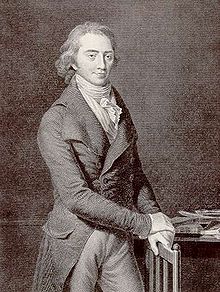- Christoph Wilhelm Hufeland
-
Christoph Wilhelm Friedrich Hufeland (12 August 1762, Langensalza – 25 August 1836, Berlin) was a German physician. He is famous as the most eminent practical physician of his time in Germany and as the author of numerous works displaying extensive reading and a cultivated critical faculty.
Contents
Biography
Hufeland was born at Langensalza, Thuringia and educated at Weimar, where his father held the office of court physician to the grand duchess. In 1780 he entered the University of Jena, and in the following year went on to Göttingen, where in 1783 he graduated in medicine.
After assisting his father for some years at Weimar, he was called in 1793 to the chair of medicine at Jena, receiving at the same time the positions of court physician and professor of Pathology at Weimar. In 1798 Frederick William III of Prussia granted him the position director of the medical college and generally of state medical affairs at the Charité, in Berlin. He filled the chair of pathology and therapeutics in the University of Berlin, founded in 1809, and in 1810 became councillor of state. In 1823, he was elected a member of the Royal Swedish Academy of Sciences.
In time he became as famous as Goethe, Herder, Schiller, and Wieland in his homeland.
Hufeland was the inventor of the term macrobiotic, was Physician Royal to the King of Prussia, as well as giving medical attention to the following illustrious patients: "Johann Wolfgang Goethe (1749-1832), Johann Gottfried von Herder (1744-1803), Schiller (1739-1805), and Christoph Martin Wieland (1732-1813)."[1] He was also a close friend of Samuel Hahnemann and published many of his original writings in his Journal. He also "joined the Illuminati order at this time, having been introduced to freemasonry in Göttingen in 1783."[2] He also seems to have professed an interest in Chinese Alchemy and methods of extending longevity.[3]
The most widely known of his many writings is the treatise entitled Makrobiotik oder Die Kunst, das menschliche Leben zu verlängern (1796), which was translated into many languages, including in Serbian by Jovan Stejić in Vienna in 1828. Of his practical works, the System of Practical Medicine (System der praktischen Heilkunde, 1818-1828) is the most elaborate. From 1795 to 1835 he published a Journal der praktischen Arznei und Wundarzneikunde. His autobiography was published in 1863.
Bibliography
Works
- Enchiridion medicum oder Anleitung zur medizinischen Praxis: Vermächtniß einer Fünfzigjährigen Erfahrung. Sechste Auflage. Jonas Verlagsbuchhandlung, Berlin,
- Medizinischer Nutzen der elektrischen Kraft beim Scheintod, Verlag Rockstuhl, Bad Langensalza, 1. Reprintauflage 1783/2008, ISBN 978-3-938997-37-6
- Makrobiotik oder Die Kunst das menschliche Leben zu verlängern, 6. Aufl. Berlin 1842
- Aphorismen und Denksprüche, Verlag Rockstuhl, Bad Langensalza, 1. Reprintauflage 1910/2009, ISBN 978-3-86777-066-8
- Bibliothek der practischen Heilkunde Veröffentlicht in der academischen Buchhandlung, 1802. Notizen: v. 6 Digitised on Google Books
Studies
- Helmut Busse: Christoph Wilhelm Hufeland, Blaeschke Verlag, St. Michael, Austria, 1982
- Klaus Pfeifer: Medizin der Goethezeit - Christoph Wilhelm Hufeland und die Heilkunst des 18. Jahrhunderts, Verlag Böhlau, Cologne, 2000, ISBN 978-3-412-13199-9
- Günther Hufeland: Christoph Wilhelm Hufeland (1762-1836), Verlag Rockstuhl, Bad Langensalza, 2002, ISBN 978-3-936030-79-2
- Wolfgang U. Eckart: Geschichte der Medizin, Heidelberg 2005
Notes
References
 This article incorporates text from a publication now in the public domain: Chisholm, Hugh, ed (1911). Encyclopædia Britannica (11th ed.). Cambridge University Press.
This article incorporates text from a publication now in the public domain: Chisholm, Hugh, ed (1911). Encyclopædia Britannica (11th ed.). Cambridge University Press.
Categories:- 1762 births
- 1836 deaths
- People from Bad Langensalza
- German physicians
- 18th-century German physicians
- Members of the Prussian Academy of Sciences
- Members of the Royal Swedish Academy of Sciences
- People from the Electorate of Saxony
- University of Jena alumni
- University of Jena faculty
- University of Göttingen alumni
- Humboldt University of Berlin faculty
- Illuminati members
Wikimedia Foundation. 2010.


